ENTRENAMIENTO DE AJEDREZ 1: Análisis de partida stayoutoftherz vs eniolw | CHESS TRAINING 1: Game Analysis stayoutoftherz vs eniolw
16
About :
♔ Entrenamiento de Ajedrez 1: Análisis de partida stayoutoftherz vs eniolw
(Versión en español | Spanish Version)
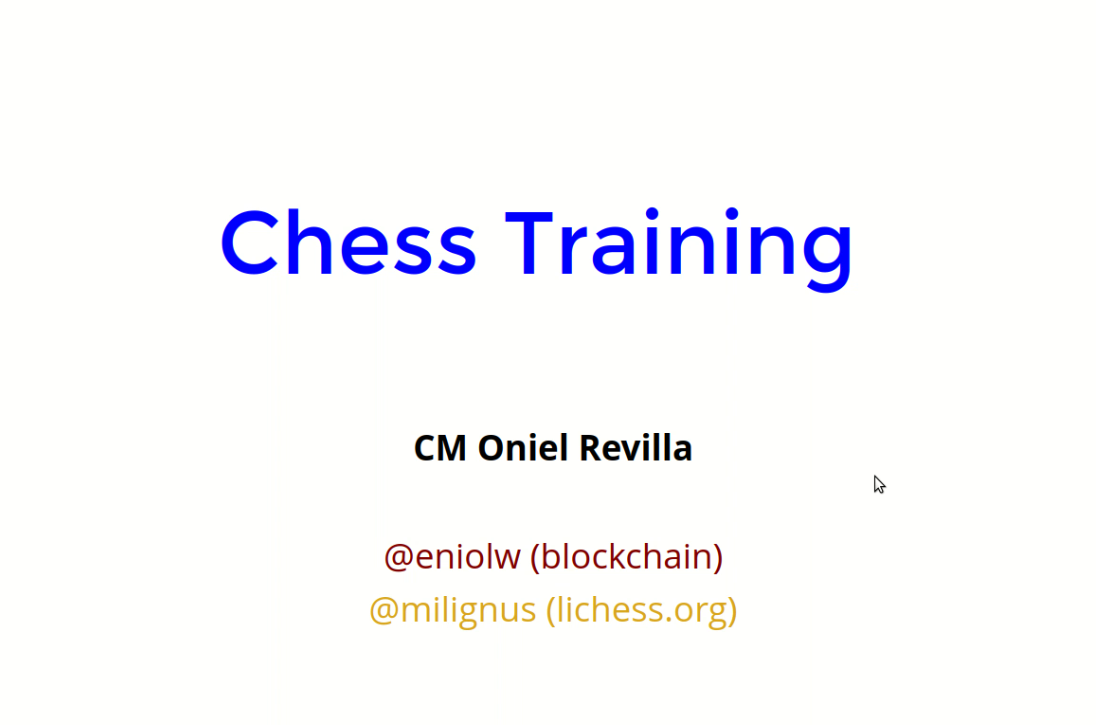
El ajedrez como todo otro deporte requiere de entrenamiento, especialmente si te estás dedicando seriamente a él y quieres conseguir resultados competitivos. Bueno, ¿cómo hacerlo?
En cuanto a los materiales, la literatura sobre ajedrez es altamente extensa. Tanto que no creo exagerado afirmar que hay más libros sobre ajedrez que sobre cualquier otro juego o deporte en el mundo. Esto es bueno, pues hace que conseguir material de estudio no sea un problema.
El único problema de esta sobreabundancia, sin embargo, es que puede ser abrumadora, sobre todo para un jugador novicio o alguien que nunca ha entrenado por su cuenta o no tenga las herramientas metodológicas. Hay que saber seleccionar los contenidos y someterse a los métodos correctos de entrenamiento, ya que "entrenar" a alguien no es lo mismo que "enseñarle".
Ahora bien, me estoy proponiendo iniciar una serie de videos y de posts sobre entrenamiento de ajedrez. En ellos compartiré algunos tips para que el lector y audiencia interesada puedan beneficiarse. También me propongo enseñar conceptos ajedrecísticos usando diferentes métodos a todo tipo de jugadores: principiantes, intermedios y avanzados.
Y hablando de métodos, uno de los más importantes, y que probablemente usaremos más a menudo, es el análisis de las partidas propias. Un ajedrecista dedicado debe hacer una visión introspectiva de su propio juego para saber qué mejorar, dado que una partida de ajedrez posee varias aristas y jugarla requiere de varias habilidades. De allí que analizar las propias partidas es bastante útil y no debería ser descuidado por parte de los ajedrecistas.
De hecho, para este primer vídeo/post analizaremos una partida jugada recientemente entre @stayoutoftherz y mí persona en un torneo amistoso realizado en lichess.org hace una semana. En ella veremos cómo mejorar la apertura en la variante Capablanca de la Defensa NimzoIndia y aprenderemos otros varios conceptos de ajedrez. ¡Te animo a que veas el vídeo ya que se explica por sí solo!

Un momento crucial de la partida en el que hay que ser consecuente con el plan de apertura de Capablanca. ¿Podrás descubrirlo? Ve el vídeo para saber más.
Por cierto, si sabes manejar software de ajedrez, entonces la siguiente transcripción de la partida en formato PGN podría ser de utilidad:
[Event "HIVE Olympia Round 3 Arena"]
[Site "https://lichess.org/PYyusRiH"]
[Date "2021.08.07"]
[White "stayoutoftherz"]
[Black "eniolw"]
[Result "0-1"]
[UTCDate "2021.08.07"]
[UTCTime "19:04:03"]
[WhiteElo "1977"]
[BlackElo "2380"]
[WhiteRatingDiff "-1"]
[BlackRatingDiff "+1"]
[Variant "Standard"]
[TimeControl "60+1"]
[ECO "E38"]
[Opening "Nimzo-Indian Defense: Classical Variation, Berlin Variation"]
[Termination "Normal"]
[Annotator "lichess.org"]
1. d4 Nf6 2. c4 e6 3. Nc3 Bb4 4. Qc2 c5 { E38 Nimzo-Indian Defense:
Classical Variation, Berlin Variation } 5. Nf3 O-O 6. e3 Nc6 7. a3 Bxc3+
8. bxc3 d6 9. Bd3 e5 10. dxe5 dxe5 11. Be2 e4 12. Nd2 Re8 13. O-O b6
14. Rd1 Qc7 15. a4 Ba6 16. a5 Nxa5 17. Nb3 Nxc4 18. Rxa6 Ne5 19. Bb5
Red8 20. Rxd8+ Rxd8 21. Nd2 Qb7 22. Be2 h5 23. Qa2 Rd7 24. Ra3 h4
25. Qc2 h3 26. Bf1 b5 27. gxh3 c4 28. Ra2 Nd3 29. Ra1 Qd5 30. Bg2 Qf5
31. Qd1 Qxf2+ 32. Kh1 Ne1 33. Bf1 Nf3 34. Nxf3 Rxd1
{ White resigns. } 0-1
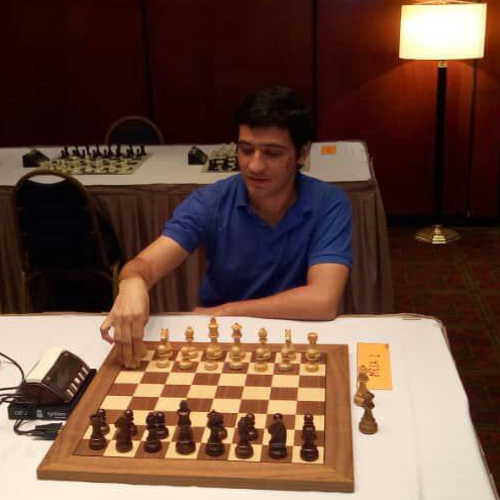
Sobre el autor:
Soy Oniel Revilla (@eniolw), un ajedrecista venezolano con título de Candidate Master otorgado por la Federación Internacional de Ajedrez (FIDE) en 2016. Poseo más de 20 años de experiencia como deportista y más de 10 años de experiencia como instructor y entrenador de ajedrez. También soy profesor universitario en la Universidad Nacional Experimental Francisco de Miranda. Puedes aprender más sobre mi faceta ajedrecística en esta publicación.
Note: A menos que se haya indicado lo contrario, las imágenes y vídeos en este post son del autor.

Chess Training 1: Game Analysis stayoutoftherz vs eniolw
(English Version | Versión en inglés)

(Note: The video that this post features is in Spanish, but I also have another video in English covering the game I'm talking about in this post. You can watch it following this link or you can watch it directly on 3Speak too).
Chess like any other sport requires training, especially if you are seriously dedicating yourself to it and want to achieve competitive results. Well, how to do it?
As far as materials are concerned, the literature on chess is highly extensive. So much that I don't think it is an exaggeration to say that there are more books about chess than about any other game or sport in the world. This is a good thing, because it makes that getting study material is not a problem.
The only problem with this overabundance, however, is that it can be overwhelming, especially for a novice player or someone who has never trained on his own or doesn't have the methodological tools. You have to know how to select the right content and undergo the right training methods, since "training" someone is not the same as "teaching" them.
Now, I am proposing to start a series of videos and posts about chess training. In them I will share some tips for the reader/viewer and interested audience to benefit from. I also intend to teach chess concepts using different methods to all types of players: beginners, intermediate and advanced.
And speaking of methods, one of the most important, and one that we will probably use most often, is the analysis of one's own games. A dedicated chess player must make an instropestive vision of his own game to know what to improve, since a chess game has several aspects and playing it requires a number of skills. Hence, analyzing one's own games is quite useful and shouldn't be neglected by chess players.
In fact, for this first video/post we will analyze a game played recently between @stayoutoftherz and myself in a friendly tournament held at lichess.org a week ago. In it we will see how to improve the opening in the Capablanca variation of the Nimzo-Indian Defense and learn several other chess concepts. I encourage you to watch the video as it is self-explanatory!

A crucial moment of the game where you have to be consistent with Capablanca's opening plan. Can you figure it out? Watch the video to learn more.
By the way, if you know your way around chess software, then the following transcript of the game in PGN format might be helpful:
[Event "HIVE Olympia Round 3 Arena"]
[Site "https://lichess.org/PYyusRiH"]
[Date "2021.08.07"]
[White "stayoutoftherz"]
[Black "eniolw"]
[Result "0-1"]
[UTCDate "2021.08.07"]
[UTCTime "19:04:03"]
[WhiteElo "1977"]
[BlackElo "2380"]
[WhiteRatingDiff "-1"]
[BlackRatingDiff "+1"]
[Variant "Standard"]
[TimeControl "60+1"]
[ECO "E38"]
[Opening "Nimzo-Indian Defense: Classical Variation, Berlin Variation"]
[Termination "Normal"]
[Annotator "lichess.org"]
1. d4 Nf6 2. c4 e6 3. Nc3 Bb4 4. Qc2 c5 { E38 Nimzo-Indian Defense:
Classical Variation, Berlin Variation } 5. Nf3 O-O 6. e3 Nc6 7. a3 Bxc3+
8. bxc3 d6 9. Bd3 e5 10. dxe5 dxe5 11. Be2 e4 12. Nd2 Re8 13. O-O b6
14. Rd1 Qc7 15. a4 Ba6 16. a5 Nxa5 17. Nb3 Nxc4 18. Rxa6 Ne5 19. Bb5
Red8 20. Rxd8+ Rxd8 21. Nd2 Qb7 22. Be2 h5 23. Qa2 Rd7 24. Ra3 h4
25. Qc2 h3 26. Bf1 b5 27. gxh3 c4 28. Ra2 Nd3 29. Ra1 Qd5 30. Bg2 Qf5
31. Qd1 Qxf2+ 32. Kh1 Ne1 33. Bf1 Nf3 34. Nxf3 Rxd1
{ White resigns. } 0-1

About me:
I am Oniel Revilla (@eniolw), a Venezuelan chess player with the title of Candidate Master awarded by the International Chess Federation (FIDE) in 2016. I have more than 20 years of experience as an athlete and more than 10 years of experience as a chess instructor and coach. I am also a university professor at the Universidad Nacional Experimental Francisco de Miranda. You can learn more about my chess facet in this post.
Note: Unless otherwise noted, the images and videos in this post belong to the author.
Tags :
Their limit for today is $0!
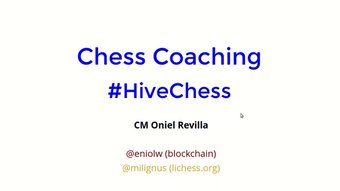
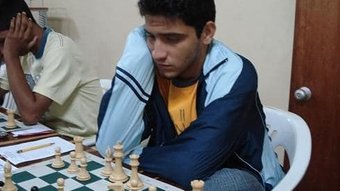
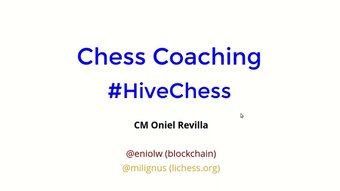
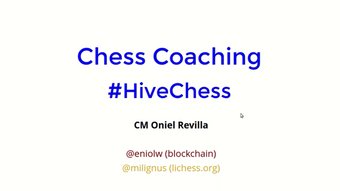
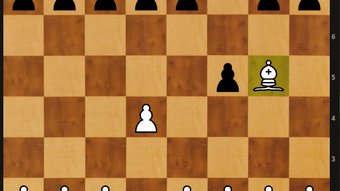











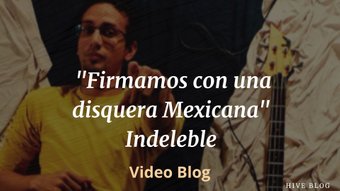











Comments:
Reply:
To comment on this video please connect a HIVE account to your profile: Connect HIVE Account